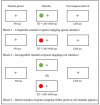Complex response inhibition and cognitive flexibility in school-aged Cypriot-Greek-speaking children who stutter
- PMID: 36467248
- PMCID: PMC9716181
- DOI: 10.3389/fpsyg.2022.991138
Complex response inhibition and cognitive flexibility in school-aged Cypriot-Greek-speaking children who stutter
Abstract
Purpose: Over the last few years, research findings have suggested limitations in executive function (EF) of children who stutter (CWS) with the evidence being more consistent in studies with preschoolers (3-6 years old) than in studies with school-aged children (6-12 years old). The purpose of the current study was to assess complex response inhibition and cognitive flexibility in school-aged CWS and their non-stuttering peers.
Methods: Participants, 19 CWS (mean age = 7.58 years, range 6.08-9.17) and 19 age-and gender-matched children who do not stutter (CWNS; mean age = 7.58 years, range 6.08-9.33), completed a visual task consisting of three task blocks. Analyses were based on response times and error percentages during the different task blocks.
Results: All participants showed expected performance-costs in task block comparisons targeting complex response inhibition and cognitive flexibility. Significant group differences were found in measures of cognitive flexibility with CWS performing slower compared to CWNS (p = 0.02). Additionally, significant block × group interactions demonstrated that CWS, compared to CWNS, slowed down more (i.e., higher performance-cost) under both complex response inhibition (p = 0.049) and cognitive flexibility task conditions (p = 0.04 for no-set-shifting and p = 0.02 for set-shifting).
Conclusion: These results are in line with some of the previous findings in school-aged CWS and suggest that CWS present lower performance in complex response inhibition and cognitive flexibility task conditions when compared to their non-stuttering peers.
Keywords: cognitive flexibility; executive function; inhibitory control; performance-cost; set-shifting; stuttering.
Copyright © 2022 Paphiti, Jansson-Verkasalo and Eggers.
Conflict of interest statement
The authors declare that the research was conducted in the absence of any commercial or financial relationships that could be construed as a potential conflict of interest.
Figures



Similar articles
-
Cognitive flexibility in younger and older children who stutter.Front Psychol. 2022 Nov 18;13:1017319. doi: 10.3389/fpsyg.2022.1017319. eCollection 2022. Front Psychol. 2022. PMID: 36467213 Free PMC article.
-
Inhibitory Control, Cognitive Flexibility, and the Production of Disfluencies in Children Who Do and Do Not Stutter.Am J Speech Lang Pathol. 2024 May;33(3):1420-1431. doi: 10.1044/2024_AJSLP-23-00242. Epub 2024 Mar 7. Am J Speech Lang Pathol. 2024. PMID: 38451741
-
Executive function and childhood stuttering: Parent ratings and evidence from a behavioral task.J Fluency Disord. 2018 Jun;56:18-32. doi: 10.1016/j.jfludis.2017.12.001. Epub 2017 Dec 30. J Fluency Disord. 2018. PMID: 29443692 Free PMC article.
-
Why we should consider pragmatics when planning treatment for children who stutter.Lang Speech Hear Serv Sch. 2004 Jan;35(1):34-45. doi: 10.1044/0161-1461(2004/005). Lang Speech Hear Serv Sch. 2004. PMID: 15049418 Review.
-
Language development in children who stutter: A review of recent research.Int J Speech Lang Pathol. 2019 Aug;21(4):368-376. doi: 10.1080/17549507.2018.1457721. Epub 2018 Apr 11. Int J Speech Lang Pathol. 2019. PMID: 29642734
Cited by
-
Stuttering: Our Current Knowledge, Research Opportunities, and Ways to Address Critical Gaps.Neurobiol Lang (Camb). 2025 Apr 2;6:nol_a_00162. doi: 10.1162/nol_a_00162. eCollection 2025. Neurobiol Lang (Camb). 2025. PMID: 40201450 Free PMC article. Review.
-
Cognitive flexibility in younger and older children who stutter.Front Psychol. 2022 Nov 18;13:1017319. doi: 10.3389/fpsyg.2022.1017319. eCollection 2022. Front Psychol. 2022. PMID: 36467213 Free PMC article.
References
-
- American Psychiatric Association . (2013). Diagnostic and statistical manual of mental disorders Arlington, VA: American Psychiatric Association.
LinkOut - more resources
Full Text Sources

